| Srl | Item |
| 1 |
ID:
055218
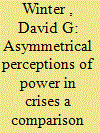

|
|
|
| 2 |
ID:
097369
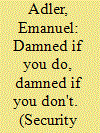

|
|
|
|
|
| Publication |
2010.
|
| Summary/Abstract |
This article seeks to initiate a new round of strategic intellectual innovation in an era when threats posed by non-state terrorist organizations and their state supporters do not resemble Cold War threats. Based on an interpretative sociological reading of the concepts of power, security, and rationality, it argues that a "damned if you do, damned if you don't" dilemma is to the post-Cold War era what the danger of surprise attack or unintended nuclear war was to the Cold War: the defining structural threat of international politics. The dilemma leaves states confronting asymmetrical warfare with the choice of reacting with force to a terrorist act or practicing appeasement. Neither approach, however, can achieve the goal of putting an end to terrorism. Deterrence sustains the dilemma by providing a rationale for why force should be used and why self-restraint is irrational. This article proposes a third option, defusing, which may be accomplished by denial (preventing provocateurs from dragging states into the use of force) and restructuration (transforming the structure and rules of the situation). Defusing relies on "performative power"-the capacity to project a dramatic and credible performance on the world stage and to decouple social actors, their audiences, and their most deeply held strategic beliefs. The force of the argument is illustrated by examples from the global "war on terror," the 2006 Lebanon War, the 2008-09 operation "Cast Lead" in Gaza, and the Iranian nuclear crisis.
|
|
|
|
|
|
|
|
|
|
|
|
|
|
|
|
| 3 |
ID:
061712
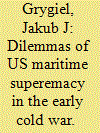

|
|
|
| 4 |
ID:
162129


|
|
|
| 5 |
ID:
118451
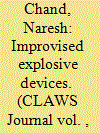

|
|
|
| 6 |
ID:
075816


|
|
|
| 7 |
ID:
132870
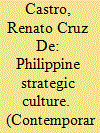

|
|
|
|
|
| Publication |
2014.
|
| Summary/Abstract |
Japan has shown three distinct strategic cultures since its emergence as a modern state in the 19th century: isolationist and non-military, militarist, and post-World War II strategic culture characterized by great reluctance to use military power abroad, even in collective self-defence. This article examines Japan's strategic culture and the potential for a fourth distinct strategic culture through the broader framework of security identity, arguing that this is evolving but has not changed as much as one might expect due to institutionalized antimilitarism and political support for the security practices it has engendered. Contemporary Japanese strategic culture can be understood through debates over recent Japanese security policy as well as actual changes in security practice. Domestic politics and a changing international environment are likely to lead Japan to a somewhat more active military role in the near term, but an analysis based on the dynamics of Japan's dominant security identity suggests that its strategic culture will continue to show a reluctance to use or develop military power beyond very limited scenarios, despite vocal efforts by some political actors to increase military activity abroad.
|
|
|
|
|
|
|
|
|
|
|
|
|
|
|
|
| 8 |
ID:
128131
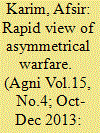

|
|
|
|
|
| Publication |
2013.
|
| Summary/Abstract |
There are a number of theories and definitions of asymmetric warfare but most definitions are inadequate to fully describe the diverse characteristics of asymmetrical warfare, because of diverse forms asymmetric warfare can take it is still obscure. It can hold many surprises and has many unexpected formats and designs. It can hold many surprises fully explored. It is not easy to formulate any standard course of action that can be employed to fight diverse forms of asymmetrical wars. There are clear indications that the current doctrinal concepts of combat have been ineffective in meeting the challenges of asymmetric wars. It is necessary to initiate a comprehensive review of the basic concepts and theories that underpin the doctrines of fighting asymmetrical wars today.
|
|
|
|
|
|
|
|
|
|
|
|
|
|
|
|
| 9 |
ID:
181225
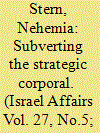

|
|
|
|
|
| Summary/Abstract |
How does the Israel Defence Forces cultivate the image of a ‘hero’ within its combat ranks? By analysing a series of online educational videos on combat heritage, this article will demonstrate how the IDF’s current heroic imagination is grounded in a subversion of the ‘Strategic Corporal’ paradigm. Within this paradigm, junior ranking soldiers are seen as increasing the chaos inherent in asymmetrical conflicts. By contrast, this article will argue that a focus on the learned elements of professionalism and training are seen as creating the conditions wherein every man (or woman) can become a ‘hero’.
|
|
|
|
|
|
|
|
|
|
|
|
|
|
|
|